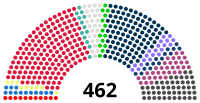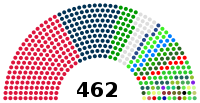National People's Assembly (Algeria)
| National People's Assembly (Algeria) | |
|---|---|
| Coat of arms of the National People's Assembly | Parliament building |

|

|
| Basic data | |
| Seat: | Algiers |
| Legislative period : | five years |
| First session: | 20th September 1962 |
| MPs: | 462 |
| Current legislative period | |
| Last choice: | 4th May 2017 |
| Chair: | President Slimane Chenine |
| Distribution of seats: |

|
| Website | |
| www.apn.dz | |
The National People's Assembly ( Arabic المجلس الشعبي الوطني, DMG al-Maǧlis aš-Šaʿbī al-Waṭanī ; French Assemblé populaire nationale ) is the lower house of the Parliament of Algeria . The National Assembly consists of 462 members who are directly elected by the population for five years. Of these, 8 seats are reserved for Algerian citizens living abroad .
story
The first parliamentary elections for independent Algeria took place on September 20, 1962. The then unicameral parliament was elected for a period of one year and served as the constituent assembly. In October 1963, President Ahmed Ben Bella disempowered them . As a result of the 1965 revolution, legislative power under Article 126 of the new constitution was transferred to the Revolutionary Council. The National People's Assembly was not restored until the new constitution was passed in 1976. Until 1991, the National Liberation Front (FLN) dominated parliament as the Algerian constitution of 1976 defined the FLN as the preferred Algerian political party.
When the first multi-party elections were due to take place in 1991, there were signs of a victory for the Islamists, whereupon the national armed forces of the Algerian people canceled the elections. The National Advisory Council was set up from April 1992 to May 1994 as a substitute donor. The National Transitional Council then took over legislative power.
In 1996 a new constitution introduced a bicameral system for mutual control of power. This consists of the National People's Assembly with 389 members at the time and the National Council with 144 members. On June 5, 1997, the first elections to the new parliament finally took place.
Electoral system
The National People's Assembly consists of 462 MPs who are elected in 48 multi-person constituencies corresponding to the wilayas (prefectures) of the country. Each constituency is assigned a number of seats based on its population: one seat per 80,000 inhabitants plus one seat for each remaining segment of 40,000 inhabitants with at least four seats per constituency.
Choose
Free parliamentary elections took place in May 1997, 2002, 2007 , 2012 and 2017. Every Algerian citizen who has reached the age of 18 is entitled to vote.
In the last elections in 2017, a total of 11,315 candidates (7,679 men and 3,636 women) ran for election.
The National Liberation Front party (FLN) became the strongest force with 161 seats and formed a social-liberal coalition with the National Democratic Collection (RND) , which could achieve 100 seats. The proportion of women is 25.8%.
On February 19, 2021, President Abdelmadjid Tebboune announced the dissolution of the National Assembly and its early election. The next elections were originally scheduled for May 2022. The election will take place on June 12, 2021.
Compositions
| Legislature | choice | composition | President of Parliament | Ruling parties |
|---|---|---|---|---|
| Constituent Assembly | 1962 |

|
September 1962 to August 1963: Ferhat Abbas
|
FLN (196) 100% |
| I. | 1964 |

|
FLN (136) 100% | |
| 1965-1976 the legislative power lay with the Revolutionary Council | ||||
| II | 1977 |

|
March 1977 to October 1990:
|
FLN (272) 100% |
| III | 1982 |

|
FLN (282) 100% | |
| III | 1987 |

|
FLN (295) 100% | |
| New constitution in 1996 with a multi-party system | ||||
| IV | 1997 | June 5, 1997 to June 10, 2002: Abdelkader Bensalah (RND) | RND (156) MSP (69) FLN (62) 62.1% of seats | |
| V | 2002 | June 10, 2002 to June 3, 2004: Karim Younès (FLN)
|
FLN (199) MRN (43) RND (49) 74.8% of the seats | |
| VI | 2007 | May 30, 2007 to May 26, 2012: Abdelaziz Ziari (FLN) | FLN (136) RND (62) MSP (52) 64.3% of the seats | |
| VII | 2012 | May 26, 2012 to May 23, 2017: Mohamed Larbi Ould Khelifa (FLN) | RND (70) FLN (221) 63% of seats | |
| VIII | 2017 | May 26, 2012 to May 23, 2017: Mohamed Larbi Ould Khelifa (FLN)
|
RND (100) FLN (161) 56.5% of the vote | |
| VIII | 2017 | since July 10, 2019: Slimane Chenine (El Bina) | RND (97) FLN (164) FM (14) TAJ (19) Mouvement populaire algérien (13) ANR (8) 68.2% of the seats | |
National consultative assembly (Conseil consultatif national)
- from January 1992 to January 1994: Redha Malek
National transition assembly (Conseil national de transition)
- from May 1994 to May 1997: Abdelkader Bensalah
Web links
Individual evidence
- ↑ a b c d Description of Parliament , website of the Algerian Embassy in Iran, accessed May 2015.
- ↑ a b IPU PARLINE database: ALGERIA (Al-Majlis Al-Chaabi Al-Watani), Last elections. Retrieved February 19, 2021 .
- ↑ https://www.zeit.de/politik/ausland/2021-02/algerien-parlament-neuwahlen-abdelmadjid-tebboune-wandel
- ↑ https://www.radioalgerie.dz/news/fr/article/20210311/208422.html







